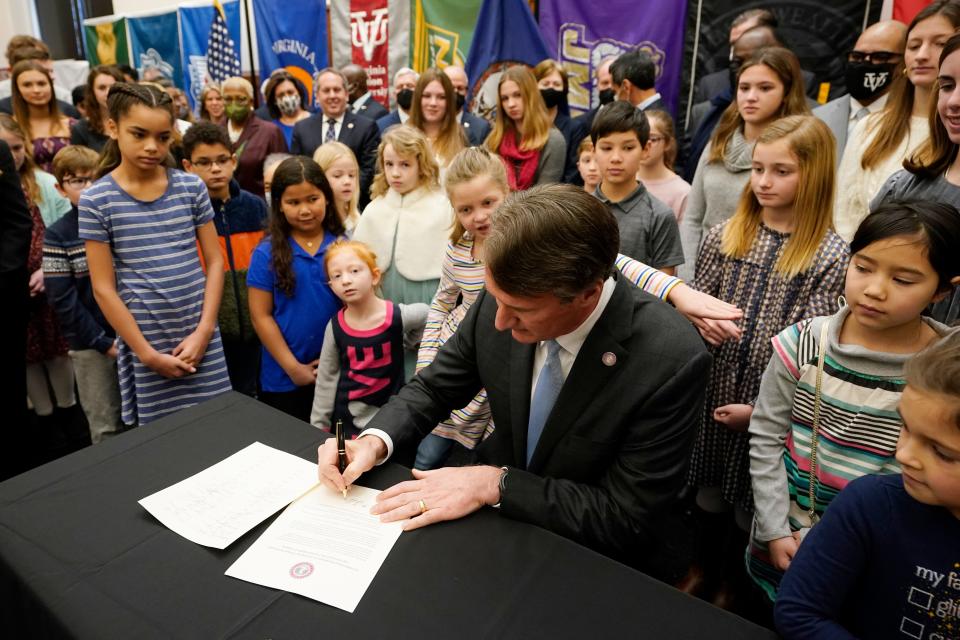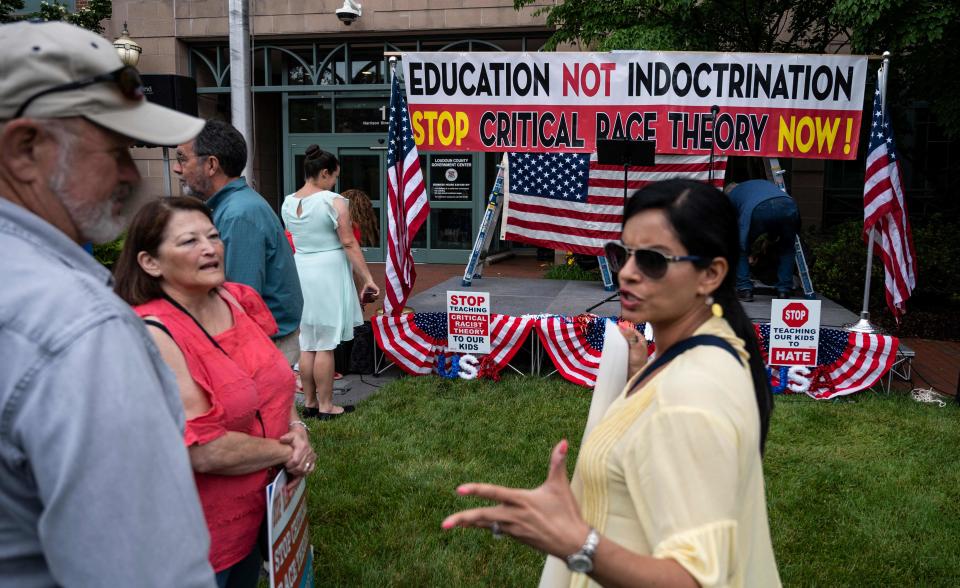Why Virginia governor's tip line is sparking new critical race theory concerns in schools
The Virginia government's tip line – which encourages parents to report unease over "divisive" teaching and COVID-19 restrictions – has engaged conservatives and riled up liberals. But it's unclear what the governor can legally do with the responses he receives.
Republican Gov. Glenn Youngkin created the email address in the wake of his first two executive orders in office: One allows parents to opt out of school mask mandates for their children, and the other takes action against what Youngkin called "inherently divisive concepts" in the classroom. Experts are concerned the tip line to report violations could have a chilling effect on what kids learn in schools.
The tip line opens the latest chapter in the national debate around how to teach children about race and diversity, joining an onslaught of bills and executive actions aimed at limiting certain classroom discussions.
We all have a unique perspective: Sign up for This is America, a weekly take on the news from reporters from a range of backgrounds and experiences.
Youngkin's mask order faces legal challenges, and it remains unclear exactly how or whether the order on "divisive" topics could affect classroom instruction, said Richard Schragger, a law professor at the University of Virginia who studies local government law.
Still, the potential for a flood of emails over a controversial lesson plan could affect how educators prepare for class.
"It could have a chilling effect on what teachers teach, which means that their decisions about what is important for the students to learn are being overridden by the fear that they'll be informed upon," Schragger said. "That means everybody in the classroom gets hurt."
Columnist Connie Schultz: Who have we become, with tip lines for school mask scofflaws and abortion bounty hunters?
"The tip line is a way to basically create a new version of the Red Scare," said Eric Ward, executive director of the Western States Center and a senior fellow with Southern Poverty Law Center, both civil rights groups.
"Instead of looking for communists in the closet and under the bed, as (former Sen. Joe) McCarthy has done," Ward said, the tip line is targeting educators who are trying to create safe spaces for all students. "It's dangerous."
The tip line creates another stressor for educators who are "already on edge" amid the coronavirus pandemic and as political debates have seeped into the classroom, said James Fedderman, president of the Virginia Education Association teachers union.
"This poorly conceived hotline is totally designed to intimidate educators who are simply trying to do their best," Fedderman said.
'Like walking a tightrope': Critical race theory bans are adding more anxiety to stressed teachers
Why Virginia created the 'help education' email address
Youngkin's office promoted the email address in a statement on updated COVID-19 safety protocols, and it started to draw attention after Youngkin discussed it in an interview this week with conservative radio host John Fredericks.
The email address is intended "for parents to send us any instances where they feel that their fundamental rights are being violated, where their children are not being respected, where there are inherently divisive practices in their schools," Youngkin said in the interview.
Youngkin, who took office earlier this month, made schools and critical race theory a central issue of his campaign.
Critical race theory, a concept taught in law schools, examines the effects of racism in U.S. society today. It has become a catch-all term among conservatives for discussions around race, racism, diversity and inclusion in the classroom.
Bans on rainbow flags, "safe spaces" signs: What happens when conservative school boards gain power at districts around the country
Well-connected conservative organizations in recent months have helped push the idea that critical race theory is being taught in primary, middle and high schools, and it has since become a divisive issue at scores of school boards meetings nationwide.
Some conservative groups argue certain lessons around race and diversity are not appropriate for the classroom, because students, especially white children, can be made to feel ashamed because of the color of their skin. Parents should have a say in whether their children are taught these topics, they argue. Meanwhile, some liberal groups say not discussing, or outright banning, such topics in schools sugarcoats history and social studies lessons. Students do not get an accurate picture of racism, slavery and other atrocities committed in the United States, they say.
Quiz: Test your knowledge of U.S. history
What about kids of color? History curriculum, books were written by and for white people

Youngkin created the email address, helpeducation@governor.virginia.gov, as "a resource for parents, teachers, and students to relay any questions or concerns," said the governor's spokesperson, Macaulay Porter.
When asked how Youngkin planned to follow up on the emails and how many had been received since the address was launched, Porter did not respond. The state Department of Education also did not reply to USA TODAY's request for comment.
USA TODAY filed a public records request for copies of the emails sent to the address as well as the government's responses.
Shouting matches, arrests and fed up parents: How school board meetings became ground zero in politics
In the radio interview, Youngkin brought up an incident at a Fairfax County public school in which students played "privilege bingo" in class by identifying their privilege on a bingo card.
The game included "military kid" in one square, which sparked an outcry from some parents. Youngkin pointed to the game as the type of "inherently divisive practice" his administration is trying to eliminate.
"We're asking for folks to send us reports and observations that they have that will help us be aware of things like 'privilege bingo,' be aware of their child being denied their rights that parents have in Virginia," he said. "We're going to make sure that we catalog it all, and it gives us a great insight into what's happening at the school level, and that gives us further ability to make sure that we're rooting it out."
In a statement, Fairfax County Public Schools apologized and said the activity and unit plan were being revised. But the district added it "remains committed to equipping students with the skills to recognize multiple perspectives, analyze bias, and examine privilege as 21st-century learners."
Can Youngkin stop 'inherently divisive concepts'?
Youngkin's executive order, among other things, directs the state's superintendent of public instruction to identify and remove Department of Education policies, guidelines, websites, best practices and other materials that "promote inherently divisive concepts." The superintendent is also supposed to review and initiate changes to Virginia's curriculum "through the regular curriculum re-evaluation process" and "identify any necessary executive and legislative actions needed to end use of all inherently divisive concepts in public education."
Virginia's Constitution gives the state Board of Education, along with local school boards and the state General Assembly, the responsibility for curricular standards, Schragger said.
"It's actually quite unclear whether the governor has authority to say anything specific about the schools, what they teach, what students learn (and) curriculum," Schragger added. Youngkin can appoint members of the Board of Education, who are then confirmed by the General Assembly.

"Inherently divisive concepts" is a term so vague it probably cannot be legally applicable, Schragger added. The executive order defines the term in context of Civil Rights Act of 1964. Divisive concepts, Youngkin says, promote the idea that one race is superior to another, or that someone is racist because of the color of their skin, among other things.
Yet the Civil Rights Act pertains to discrimination, not the banning of ideas or concepts, Schragger said. "There is a kind of an attempt to tie this executive order to law, but I think it actually doesn't really succeed," he said.
Is banning critical race theory in schools unconstitutional? Lawsuit in Oklahoma seeks to prove it.
The order could have its desired effect anyway.
Even if it does not give specific instructions to teachers or clearly define what can be taught, it could be "so nebulous that teachers just stay away from any issues that could arguably excite opposition," Schragger said.
The vague language, coupled with the email address, could have the effect of creating distrust between students and teachers, Ward said.
Teachers are concerned, Fedderman said, but he added he was sure they would focus on their students' needs instead of worrying about being reported.
"We encourage our parents to utilize that tip line to give instances of how education or how learning is coming to life in the classroom for our students to become the movers and shakers of an ever-changing society," Fedderman said.

While Virginia's actions in recent weeks have drawn national attention, states around the country have targeted "critical race theory" in various bills and other executive actions for months.
According to Education Week, 36 states since 2021 have introduced a bill or some other action to limit teaching around racism and sexism, and 14 states have enacted such restrictions.
In Florida, a bill that moved forward in the state Senate this month would prohibit public schools and private businesses from making white people feel “discomfort” when they are taught or trained about discrimination in the nation’s past.
Indiana, meanwhile, advanced a bill that would limit what teachers can say regarding race, history and politics. The bill lists a series of concepts that would be banned from Indiana's public school classrooms, including that any sex, race, ethnicity, religion, color, national origin or political affiliation is inherently superior or inferior to another. It also would allow parents who say the ban has been violated to file a complaint and, in certain cases, sue schools.
Ward said the restrictions that use language like "discomfort," "guilt" or other types of psychological anguish point to the bigger question of how children will learn about challenging topics.
"The way that we learn how to have difficult and uncomfortable conversations is actually by having difficult and uncomfortable conversations," Ward said. Having those conversations in school, he said, allows adults to guide the conversations and keep them productive and healthy. "Let's be clear: It's not as if by banning it from schools those discussions aren't going to happen. They're just going to happen out of context."
Contributing: Matthew Brown, USA TODAY; John Kennedy, Florida Capital Bureau; Arika Herron, Indianapolis Star; The Associated Press
This article originally appeared on USA TODAY: Critical race theory tip line from Va. governor sparks school concerns

 Yahoo Movies
Yahoo Movies 
